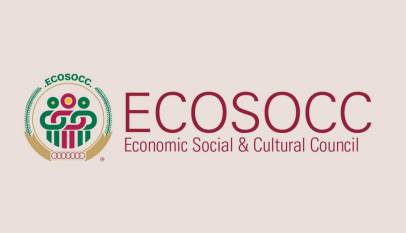AfDB, IsDB seeks to strengthen CSOs capacity in Africa’s fragile countries against COVID19
As the global response to COVID-19 pandemic transitions from emergency response to long-term reconstruction, the African Development Bank (AfDB) and Islamic Development Bank (IsDB), in collaboration with the World Bank Tuesday hosted a webinar discussion focused on strengthening the capacity of Civil Society Organizations (CSOs) in African countries affected by fragility, conflict, and violence, to respond to the effects of the pandemic.

The webinar which was themed: “Enhancing Security and Community Resilience Amid COVID-19: From Emergency to Recovery,” was attended by representatives of Multilateral Development Banks (MDBs), intergovernmental organizations, donor agencies as well as international, regional and local CSOs from across the African continent.
The virtual discussion was aimed at sharing lessons from the interventions being undertaken by various CSOs at local and national levels in response to the pandemic, so as to draw key lessons on what was working and what more needed to be done, to prevent further spread of the disease, save lives and build community resilience. Consequently, the webinar focused on the pandemic and its resultant emergency response, highlighting the experiences of frontline CSOs working on food security, community mobilization and sensitization, gender mainstreaming as well as the use of innovative technologies in the response efforts.
In her welcome remarks to participants, Vanessa Moungar, director in charge of gender, women and civil society at AfDB, said the COVID-19 pandemic had disrupted the livelihoods of millions of people with disproportionate effect on poor households, small and informal businesses, noting that “even though the rate of the coronavirus transmission in Africa appears to be slower than in any part of the world, we can already see the devastating socioeconomic effects of the crisis.”
Moungar therefore said, responding to the pandemic required active and proactive responses from not only governments but also every stakeholder in society, adding that the AfDB had subsequently, put in place several mechanisms to assist African countries to respond to the pandemic. These mechanisms, she said, would help increase the resilience of the most vulnerable communities on the continent against the virus. Additionally, she said the Bank had activated various initiatives aimed at increasing CSOs engagement during the pandemic.
“We also very much recognize the critical role of CSOs and community-based organizations (CBOs) in the crisis; indeed, we see CSOs and CBOs as being at the forefront of the response, very often they are the very first responders, despite limited resources. The Bank introduced various initiatives to communicate with CSOs during the crisis aimed at increasing and enhancing civil society engagement, particularly in countries affected by fragility, conflict or violence and therefore are most vulnerable to the effects of the pandemic,” said Moungar.
Similarly, in his welcome remarks, Amadou Thierno Diallo, acting director-general of global practices at IsDB, said the pandemic had resulted in broken down governance systems across African countries in conflict and with fragile economies, thus increasing social, economic and environmental risks and weakening institutions, coupled with mismanagement of resources, marginalization and increased inequality among the populations.
“The Horn of Africa and Lake Chad regions are good examples of regions where compounding factors are leading to extended vulnerabilities leading to ineffective and inefficient use of resources to build the resilience. The Board of Executive Directors of the Islamic Development Bank has approved US$ 2.3 billion for the IsDB Group Strategic Preparedness and Response Programme for COVID-19 pandemic. It is aimed at supporting member countries to respond, restore and restart [their economies], in order to prevent, contain and mitigate the risks and impact of COVID-19 in the short, medium and long terms,” said Diallo.
While speaking during a panel discussion on improving COVID-19 crises response and building resilience in the Horn of Africa, Sahel Region and the Lake Chad Basin, Ambassador Mamman Nuhu, executive secretary of the Lake Chad Basin Commission (LCBC), said even before the arrival of COVID-19, the Lake Chad region had suffered decades of marginalization compared to other parts of Africa adding that the region was impacted by climate change and its resultant environmental degradation in the form of drought, desert encroachment, as well as the shrinking of the Lake Chad.
Against this backdrop, Ambassador Nuhu said the population of the region had multiplied severally from over 7 million in the early 1960s to currently over 45 million, leading to rural urban migration by people in search of greener pastures, as a way of adopting to the crises occasioned by climate change, and more recently, the Boko Haram insurrection. He said although countries in the region had, in response to the COVID-19 pandemic, adopted different strategies particularly introducing palliative measures, such measures were but temporary and not sustainable.
He noted that the lockdowns imposed by countries in the region had led to the loss of means of sustenance and livelihood of millions of people surviving on daily wages, with severe security implications. “It made youths vulnerable to radicalization and being recruited to swell the ranks of Boko Haram terrorists and other criminal activities such as kidnapping for ransom, armed robbery, cattle rustling; there is also a rise in rape incidents and other forms of Gender-Based Violence (GBV),” noted the diplomat.
Also speaking at the webinar, Ornella Moderan, a civil society activist from Mali, said whether or not they believed in the existence of the virus, COVID-19 had had negative implications on communities in the Central Sahel region, such as increasing the rates of child marriages as parents tried to lower their economic burden occasioned by the pandemic. She also identified as another concern of civil society organizations during the pandemic, the capacity of security actors to enforce lockdown measures without abusing their powers.
In addition, Moderan raised the concern of youths and women being marginalized in decision-making processes about the pandemic, due to ageism and sexism, respectively. She therefore urged MDBs to invest in the CSOs capacity to create awareness and sensitize communities about the pandemic, engage with governments on response issues, as well as providing social and psychosocial support to citizens during the pandemic.
While providing an overview of AfDB’s support to African countries in response to the COVID-19 pandemic, Babatunde Omilola, manager in charge of the public health, security and nutrition at AfDB, said the Bank had, amongst other interventions, launched the record-breaking $3 billion “Fight COVID-19” Social Bond – which was until then the largest US dollars social bond transaction ever recorded in the capital market – aimed at lessening the socioeconomic effect of COVID-19 on African countries.
Additionally, Omilola said, AfDB had launched a $10 billion Response Facility to curb COVID-19, out of which $5.5 billion was for sovereign operations in AfDB countries, while $3.1 billion was for sovereign and regional operations for countries under the African Development Fund (ADF), AfDB’s concessional arm that caters to fragile countries. He said, the remaining $1.35 billion was devoted to supporting private sector enterprises in Africa.
Furthermore, he said, the Bank had earmarked a USD115 million grant from ADF for designing Regional Public Goods (RPGs) projects for the respective Regional Economic Communities (RECs) to support their member states in containing the pandemic. The Bank had also provided additional grant worth USD27 million to African Centres for Disease Control (Africa CDC) for capacity building purposes while the World Health Organisation (WHO) got USD2 million to strengthen the capacity of 41 African countries on infection prevention, testing and case management.
The MDBs said subsequent workshops will focus on new frameworks that will be required to facilitate recovery, build resilience, and adapt institutions and systems to the realities of post-COVID19 African societies. According to AfDB, there are currently more than 250 million Africans affected by fragility, with development prospects in four major regions namely Horn of Africa, Sahel, Mano River Union and Great Lakes, and Central Africa, being particularly at risk. Consequently, the banks believed the current COVID19 pandemic posed a great threat that could overwhelm existing institutional capacities for managing political, economic, social and environmental challenges across these regions.













